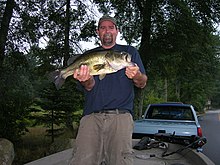This is an old revision of this page, as edited by 66.193.232.253 (talk) at 21:22, 24 July 2006 (→External links). The present address (URL) is a permanent link to this revision, which may differ significantly from the current revision.
Revision as of 21:22, 24 July 2006 by 66.193.232.253 (talk) (→External links)(diff) ← Previous revision | Latest revision (diff) | Newer revision → (diff)| This article does not cite any sources. Please help improve this article by adding citations to reliable sources. Unsourced material may be challenged and removed. Find sources: "Bass fishing" – news · newspapers · books · scholar · JSTOR (Learn how and when to remove this message) |

Bass Fishing is the pursuit of the North American fish known colloquially as black bass, this includes largemouth bass (Micropterus salmoides (Lacepede), smallmouth bass (Micropterus dolomieui), Kentucky bass or Spotted bass (Micropterus punctatus), Guadalupe bass (Micropterus treculii), and many other species and subspecies of the genus Micropterus.
Modern bass fishing has evolved into a multi-billion dollar industry. The sport has changed drastically since the 1950s; from humble beginnings it has become the second most specifically sought-after game fish in the United States. The sport has driven the development of all manner of fishing gear, including rods, reels, lines, lures, electronic depth and fish-finding instruments, drift boats, float tubes, and specialized bass boats.
Angling
All black bass are well-known as strong fighters, and are fished recreationally. Depending upon species and various other factors such as water quality and availability of food, black bass may be found in lakes, rivers, streams, reservoirs, or even ponds. Largemouth are known for their overall size and resistance when hooked, while smallmouth bass tend to jump and fight on the surface when hooked, in order to throw the hook. Bass are usually fileted when taken for the table, and the flesh is white and firm when cooked. However, more and more bass anglers are adopting "catch and release" angling, where the bass are returned to the water after being hooked and retrieved.
Bass have traditionally been caught with standard bait casting or spinning gear, using either artificial lures or live bait (See Fishing rod, Fishing reel). In recent years Fly fishing for bass, particularly smallmouth bass, has become more popular.
Fishermen, conservation groups, and governmental wildlife departments have introduced black bass of various species across the world for the sport of fishing. Outside North America, Japan and South Africa have active programs.
Other Species
Black bass should not be confused with a multitude of unrelated fish species found around the world and called "bass", such as the butterfly Peacock Bass (Cichla ocellaris) and speckled Peacock bass (Cichla temensis), Australian bass, and Rock bass (Ambloplites rupestris).
Competition
There are two major bass fishing competitions in the United States. One is the Bassmaster Tournament Trail, organized by the Bass Anglers Sportsman's Society. It was started by Ray Scott, the "father" of competitive bass fishing. First held in 1969, today, professionals like Michael Iaconelli, Aaron Martens, Rick Clunn, and Luke Clausen are household names to many American sports fans. There are 12 events in which the top 50 anglers compete. The top prize in the Bassmaster Classic is $200,000. The other event is the Wal-Mart FLW Tour, sponsored by Ranger Boats. The top prize of the FLW Cup is $1 Million. Both tours are nationally televised on networks like ESPN and Fox Sports Net.
In modern bass fishing competitions, caught bass are placed in a live well, and released as soon as caught and weighed by officials. Competitors are penalized heavily for dead fish and in some cases dead fish are not weighed. Fish turned in for weighing are immediately released or placed in tanks and treated for stress and injury to their slime coats, then released back into the water.
Competitive bass fishing has also spread to anglers in other countries such as Japan, Australia and South Africa. A Japanese angler (Takahiro Omori) won the 2004 Bassmaster Classic title. Australian tournaments are based on a native freshwater fish called Australian bass that is unrelated to largemouth bass.